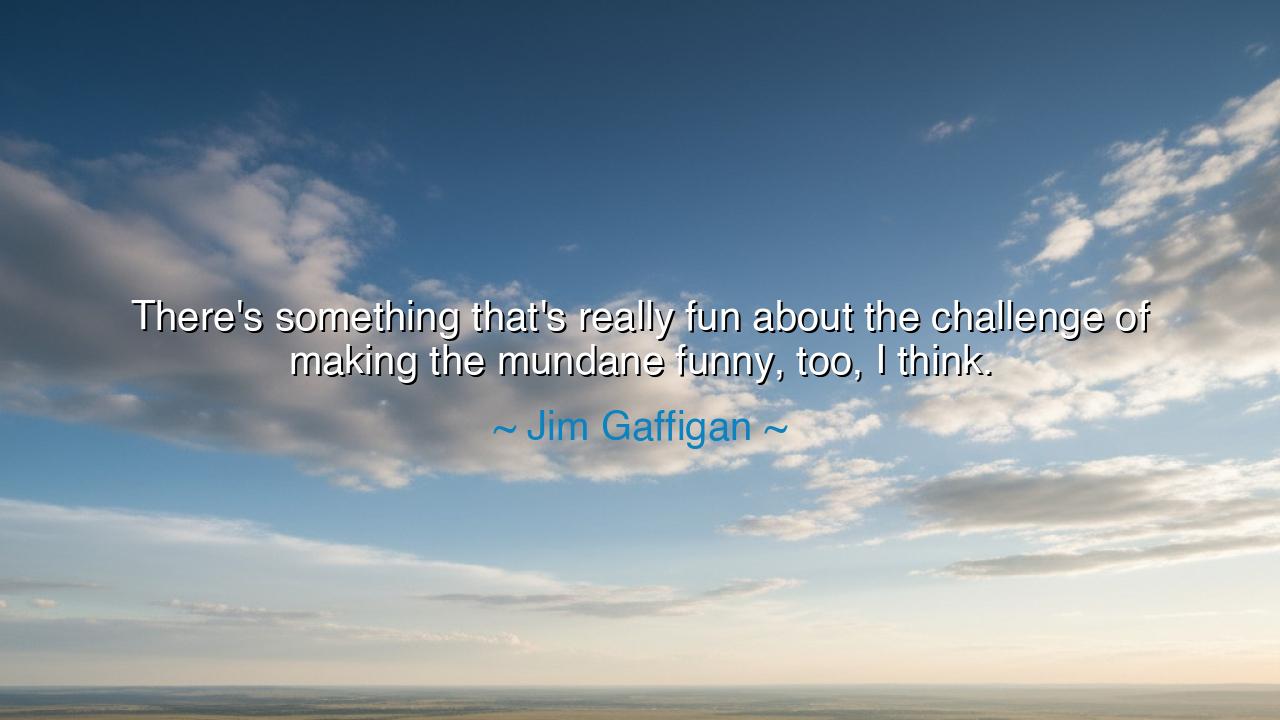
There's something that's really fun about the challenge of making
There's something that's really fun about the challenge of making the mundane funny, too, I think.





Hear, O seekers of humor and hidden truth, the words of Jim Gaffigan, a gentle sage of laughter, who said: “There’s something that’s really fun about the challenge of making the mundane funny, too, I think.” At first, these words seem light, like a passing smile, but beneath them lies a profound meditation on creativity, perception, and the sacred art of finding joy in ordinary life. For in this reflection, Gaffigan speaks not only of comedy, but of a way of seeing the world—a way that turns the dull into delightful, and the forgotten moments of daily existence into treasures of mirth and meaning.
In his words, Gaffigan reminds us that the mundane—the small, repetitive, unnoticed acts of life—is not empty, but brimming with potential. The great comedians, like the great poets and philosophers, are those who can look upon the simplest of things—a sandwich, a nap, a family dinner—and uncover within it a mirror of the human condition. To make the mundane funny is to perform a kind of alchemy: to transform the base metal of everyday experience into gold. It is to find wonder in the plain, and laughter in the quiet corners where most see only habit.
This challenge, as he calls it, is more than a task of wit—it is a discipline of attention. In a world that chases spectacle and grandness, to find humor in the ordinary requires the eye of a mystic and the heart of a child. The ancient philosophers spoke of this same art, though in different words. Socrates, walking barefoot through Athens, found wisdom in the marketplace, in the chatter of vendors and the gossip of neighbors. He knew, as Gaffigan knows, that truth and beauty often hide in the simplest places—waiting to be discovered by those who look with love, not impatience.
To make the mundane funny, then, is to remind humanity that life’s worth is not measured in drama or novelty, but in presence. The act of noticing is itself a form of reverence. When Gaffigan turns his gaze upon the everyday—upon laziness, parenting, food, or sleep—he dignifies those experiences by transforming them into shared laughter. In that laughter, we see ourselves, not as heroes or villains, but as humans—fragile, foolish, and magnificent in our ordinariness. His humor does not mock life; it sanctifies it. For laughter, when born from love, becomes a bridge between the trivial and the transcendent.
Consider the story of Henri de Toulouse-Lautrec, the painter of the Moulin Rouge. Surrounded by dancers, bartenders, and tired faces of the Paris night, he found art not in kings or saints, but in the flicker of light upon a glass, the tired gesture of a waiter, the slouch of a cabaret singer. What others dismissed as ordinary, he saw as divine. In the same spirit, Gaffigan’s art teaches us that the sacred can dwell in the comic, and the profound can live within the petty. Both men remind us that there is holiness in attention itself—that the mundane, when truly seen, becomes meaningful.
There is also humility in Gaffigan’s words. For to make the mundane funny is to set aside vanity and grandeur, to acknowledge that laughter does not require spectacle. True humor does not need to reach for shock or cruelty; it finds its power in honesty. The ordinary life is already full of contradictions—of small absurdities, frustrations, and delights. The wise comedian, like the wise philosopher, reveals these truths gently, inviting others to laugh not at the world, but with it. This laughter is healing; it teaches us that imperfection is not failure, but evidence of being alive.
Therefore, my children of the simple and the sacred, learn this from Jim Gaffigan’s wisdom: do not seek greatness only in the extraordinary. Seek it in the ordinary moments you overlook. In every daily task, there lies a hidden spark of humor, if only you pause long enough to see it. When you wash dishes, when you sit in traffic, when you stumble through small talk—there, too, is life unfolding. Learn to laugh not in spite of it, but because of it. To find joy in the mundane is to master the art of contentment; to make the mundane funny is to share that joy with others.
So remember: the true measure of wisdom is not in how grandly one speaks, but in how deeply one sees. To make others laugh at the ordinary is to awaken them to the miracle of existence itself. And when we learn, as Gaffigan teaches, to delight in the mundane, we find that nothing in life is truly dull. For everything—every crumb, every sigh, every silence—shines with the quiet, comic beauty of being alive.






AAdministratorAdministrator
Welcome, honored guests. Please leave a comment, we will respond soon